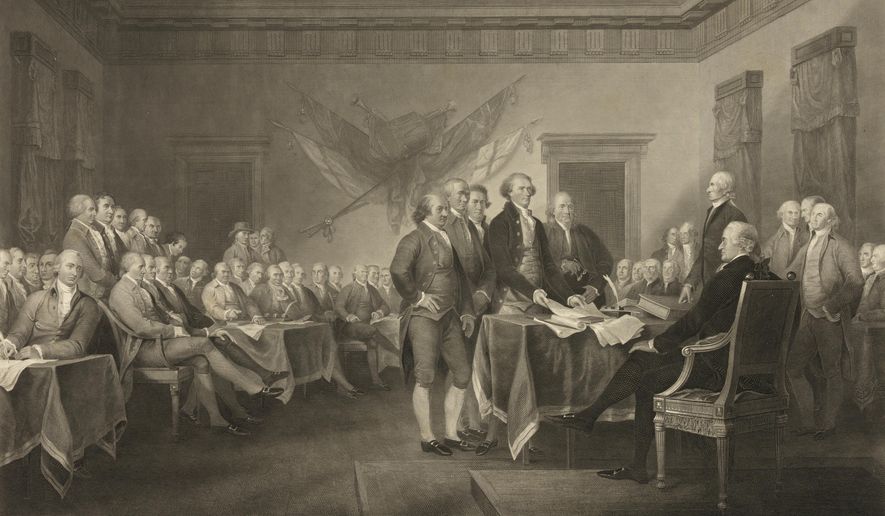OPINION:
Dear Dr. E: I am trying to teach my children the importance of understanding the values of our Founding Fathers. More specifically, I want my kids to understand why the writers of the Constitution and the Declaration of Independence believed as they did and what ideas influenced them most profoundly as they gave birth to our nation. If you were asked what one person most single-handedly influenced the founding of the United States, what would you say? — HOME-SCHOOLING MOM IN SOUTH DAKOTA.
Dear Home-Schooling Mom: In 1973, two political scientists named Donald Lutz and Charles Hyneman decided they would do a comprehensive survey of “American rhetoric” during the founding era of our country. To this end, Lutz and Hyneman took on the enormous task of reading everything published in America between 1760 and 1807. The effort took them ten years and covered fifteen thousand documents. The goal was to answer your question: What ideas most influenced the American Revolution? Was it the ideas of Enlightenment thinkers such as Montesquieu, Locke, Hume, and Hobbes? Or was it the influence of the ancient classics written by Plutarch and Cicero that most inspired the first generation of Americans?
The first sentence of Lutz’ and Hyneman’s conclusion makes it quite clear: “If we ask what book was more frequently cited by Americans during the founding era,” they said, “the answer…is: the Book of Deuteronomy.” And who is the author of Deuteronomy? Moses!
In his book America’s Prophet, Bruce Feiler argues that Moses’s influence on America is due to our Founding Fathers’ understanding of one fundamental truth: the paradox of liberty and law. The lesson that the first generation of Americans learned from Moses and the Pentateuch is quite simple: Liberty presupposes law. There is no freedom outside the fences of God.
We, however, often think of the law as being the opposite of freedom. Even within scripture, law and liberty could be misconstrued as being on opposing sides. But on closer inspection, Moses makes it clear that God’s laws do not restrict our freedoms but rather serve to define, assure, and protect them. Like the fence that keeps your dog from running out into the highway, God’s laws set the boundaries. They exist to maximize our enjoyment of His creation while protecting us from misusing our liberty to hurt ourselves or others.
If you read the prophets, you are hard-pressed to find any place where they wrote that the law resulted in a loss of freedom. Instead, we are warned that disobeying God’s law will always lead to brokenness, bondage, and slavery. Likewise, in the New Testament, we read over and over again that we are “free in Christ.” And even Jesus himself directly admonishes us that we “shall know the truth and the truth shall set us free.”
The Bible makes it clear. We are shown the paradox of discipline and freedom, liberty and law, over and over again in unambiguous terms. This frankly can’t be missed if you bother to read it. God’s law is always liberating, but the consequences of not living within the boundaries of God’s law always result in the loss of liberty for ourselves and for those around us.
Whether it be the prose of Genesis, the legal language of Leviticus, or the poetry of the Psalms, the repeated message is this: Blessings are promised for keeping the law, and curses come from the opposite. Within the law, God’s people find more liberty rather than less.
G. K. Chesterton once wrote that if you get rid of the “big laws of God,” you don’t get more liberty but, to the contrary, much less. In other words, if we refuse to live by the ten simple laws given to us by God (and frankly, Jesus seems to have summarized them in just two!), we get reams upon reams of little laws that rush in to fill the vacuum; thousands of rules and regulations imposed on us by the government and arrogant oligarchs in Washington, D.C.; untold little laws are made up by the “smarter-than-thous” who think they know better than we do about how we should live, down to the point where they are now telling us which pronouns to use and how we should use the bathroom. This is not liberty. This is not freedom. It is fascism, pure and simple.
The best lesson for you to teach your children is this: If Moses has so profoundly influenced our national character and personal freedoms, then wouldn’t we be wise to reconsider his teaching and his lessons before departing from his laws and God’s?
If you are seeking guidance in today’s changing world, Higher Ground is there for you. Everett Piper, a Ph.D. and a former university president and radio host, takes your questions in his weekly ’Ask Dr. E’ column. If you have moral or ethical questions for which you’d like an answer, please email askeverett@washingtontimes.com and he may include it in a future column.




Please read our comment policy before commenting.